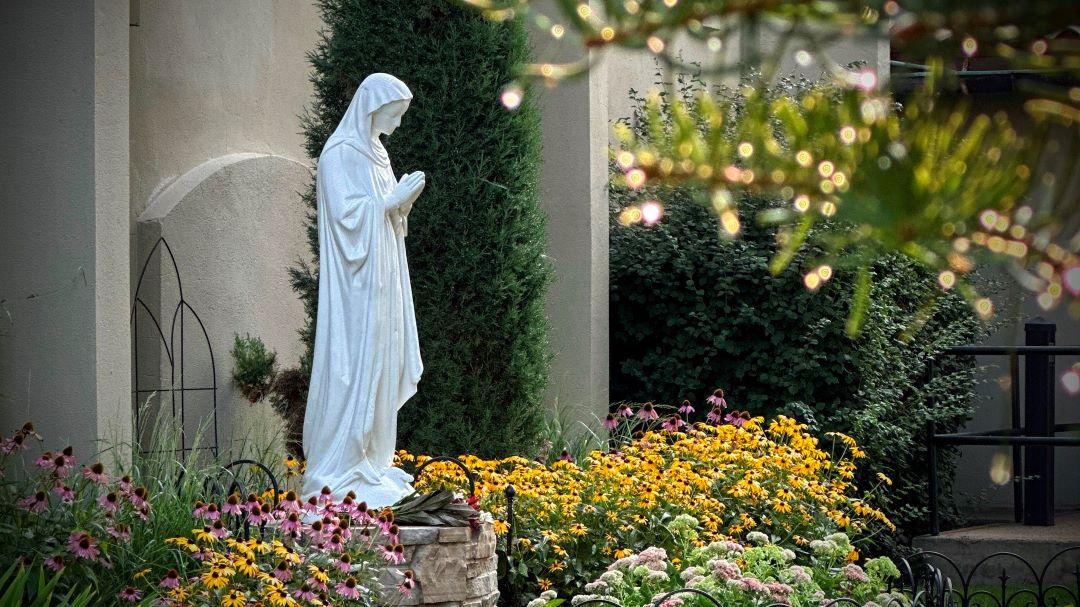Dear Friends,
This week, the Church celebrates the feast of the Assumption of Mary into heaven. This was a long-held belief in the Church and was made official by Pius XII in 1950. In preparation for that feast, I am giving you, this week and next, a few excerpts of an article that appeared in a recent Commonweal magazine, written by Brad East, a professor of theology in Texas. I think he does a good job of summarizing Mary’s place in salvation. The article is entitled “Mother of the Unborn God” and the full article can be found online.
In seven years, the Church will celebrate the 1,600-year anniversary of the Council of Ephesus, the third of seven great ecumenical councils common to East and West. The Council came at a time of civil and ecclesial unrest. Rome had been sacked in 410; in 430, St Augustine died as Vandals besieged the walls of Hippo. The controversies of the previous century over Christ and the Trinity were more or less settled. As ever, however, settled business begets more business. The answers to one set of questions generate new questions.
One of those new questions concerned the mother of Jesus. If Jesus is God, as the bishops at both Nicaea (325) and Constantinople (381) had affirmed, then what does that make Mary? In her song of praise to God, she had prophesied that all generations would call her blessed. At the same moment, St. Elizabeth called her “the mother of my Lord.” So Jesus is the Lord, and Mary is his mother. Does saying so settle the question? It doesn’t—though some future theologians, such as John Calvin, wished it had. Among the faithful, a title arose for Mary: “Theotokos.” The verbal root of the Greek tokos means “to bear.” Hence Theotokos refers to the God-bearer: Mary is the one who bore God in her womb.
Could a woman really do that? Nestorius, the bishop of Constantinople, argued the negative case. Mary, he acknowledged, was the mother of the man Jesus and thus the mother of the Messiah. But she could not have been the mother of God himself, for God has no mother. God is uncreated, and it is unseemly and misleading to say otherwise. St. Cyril, the bishop of Alexandria, disagreed. If Jesus is God and Mary his mother, then it follows quite plainly that she is the mother of God. Qualify it as much as you like—say, for example, that Jesus is God in the flesh—but the title stands. As does the scandal. For the scandal of the Theotokos is the scandal of the Gospel itself. The good news of Jesus is that his name is Immanuel: God with us. The Incarnation trips up the world because it says not only that the Creator became a creature, but that he became like you and me in everything but sin. He was a man who could suffer and die. He was a boy who could run and cry. He was an infant, nursing at the breast. He was an unborn child, gestating in his mother’s womb.
Is the womb a fitting residence for the Creator of the universe? Could God become small enough to occupy a uterus? As small as a clump of cells? Infinitesimally tiny—this, the infinite God? Gestating, growing, developing, all the while hidden from view? A secret known only to his mother, his adoptive father, and a few relatives? To all this Cyril said: yes. “He did not consider it beneath him to follow a path congruous to this plan”—namely, the plan that he become human so that we might become divine—“and so he is said to have undergone a birth like ours, while all the while remaining what he was.” As St. Bernard of Clairvaux would say centuries later, “There was never any moment…when that fullness which he assumed at the instant of his conception in the womb was in any way diminished or augmented. He was perfect from the beginning.” And so Cyril concludes: “He was God in an appearance like ours, and the Lord in the form of a slave. This is what we mean when we say that he became flesh, and for the same reasons we affirm that the holy virgin is the Mother of God.”
At the Council of Ephesus in 431, Cyril’s position won and Nestorius’s lost. Two decades later, at the Council of Chalcedon, the title of Theotokos was reaffirmed as orthodox. And ever since, the Church has reaffirmed the truth that, because Jesus is God, Mary is God’s mother.
Join us as we celebrate Mary’s entrance into heaven this week.
Peace,
Fr. Damian



